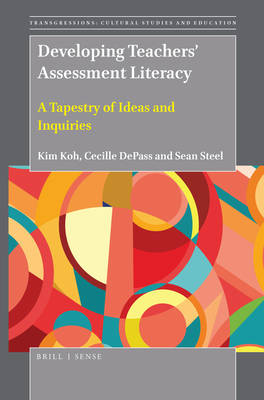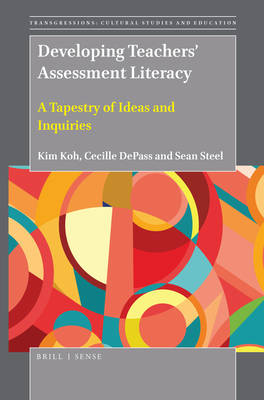
- Afhalen na 1 uur in een winkel met voorraad
- Gratis thuislevering in België vanaf € 30
- Ruim aanbod met 7 miljoen producten
- Afhalen na 1 uur in een winkel met voorraad
- Gratis thuislevering in België vanaf € 30
- Ruim aanbod met 7 miljoen producten
Zoeken
Developing Teachers' Assessment Literacy
A Tapestry of Ideas and Inquiries
Kim Koh, Cecille Depass, Sean Steel
€ 209,45
+ 418 punten
Uitvoering
Omschrijving
Since the turn of the 21st century, developing teachers' assessment literacy has been recognized as one of the key levers for improving instructional practice and student learning in light of the education reforms worldwide. A substantial body of literature is focused on teachers' assessment literacy or teachers' capacity in assessment, and teachers' continuing professional development in assessment. As we approach the third decade of the 21st century, developing teachers' assessment literacy needs to be more responsive to the need of both preservice and inservice teachers who come from linguistically and culturally diverse backgrounds. The authors concur that both preservice and inservice teachers in today's complex educational contexts require a deeper level of understanding of assessment. Additionally, teachers are highly encouraged to appreciate the history of educational assessment in different sociocultural and political contexts, as well as to know how to determine the merits of a range of assessment practices best suited for their lesson planning and classroom teaching. In this book, the authors discuss significant aspects of developing teachers' assessment literacy in different sociocultural and political contexts. Based on their respective educational backgrounds, academic experiences, and applied fields of study, each of the authors presents a critical response to the topic of assessment. Their accounts represent the complexity of the subject through a breadth and range of content and perspectives. By expanding the terms of reference regarding assessment, the authors have developed a book with a far richer panorama on assessment as a springboard for inquiry.
Specificaties
Betrokkenen
- Auteur(s):
- Uitgeverij:
Inhoud
- Aantal bladzijden:
- 138
- Taal:
- Engels
- Reeks:
- Reeksnummer:
- nr. 134
Eigenschappen
- Productcode (EAN):
- 9789004385665
- Verschijningsdatum:
- 1/08/2019
- Uitvoering:
- Hardcover
- Formaat:
- Genaaid
- Afmetingen:
- 157 mm x 236 mm
- Gewicht:
- 158 g

Alleen bij Standaard Boekhandel
+ 418 punten op je klantenkaart van Standaard Boekhandel
Beoordelingen
We publiceren alleen reviews die voldoen aan de voorwaarden voor reviews. Bekijk onze voorwaarden voor reviews.











